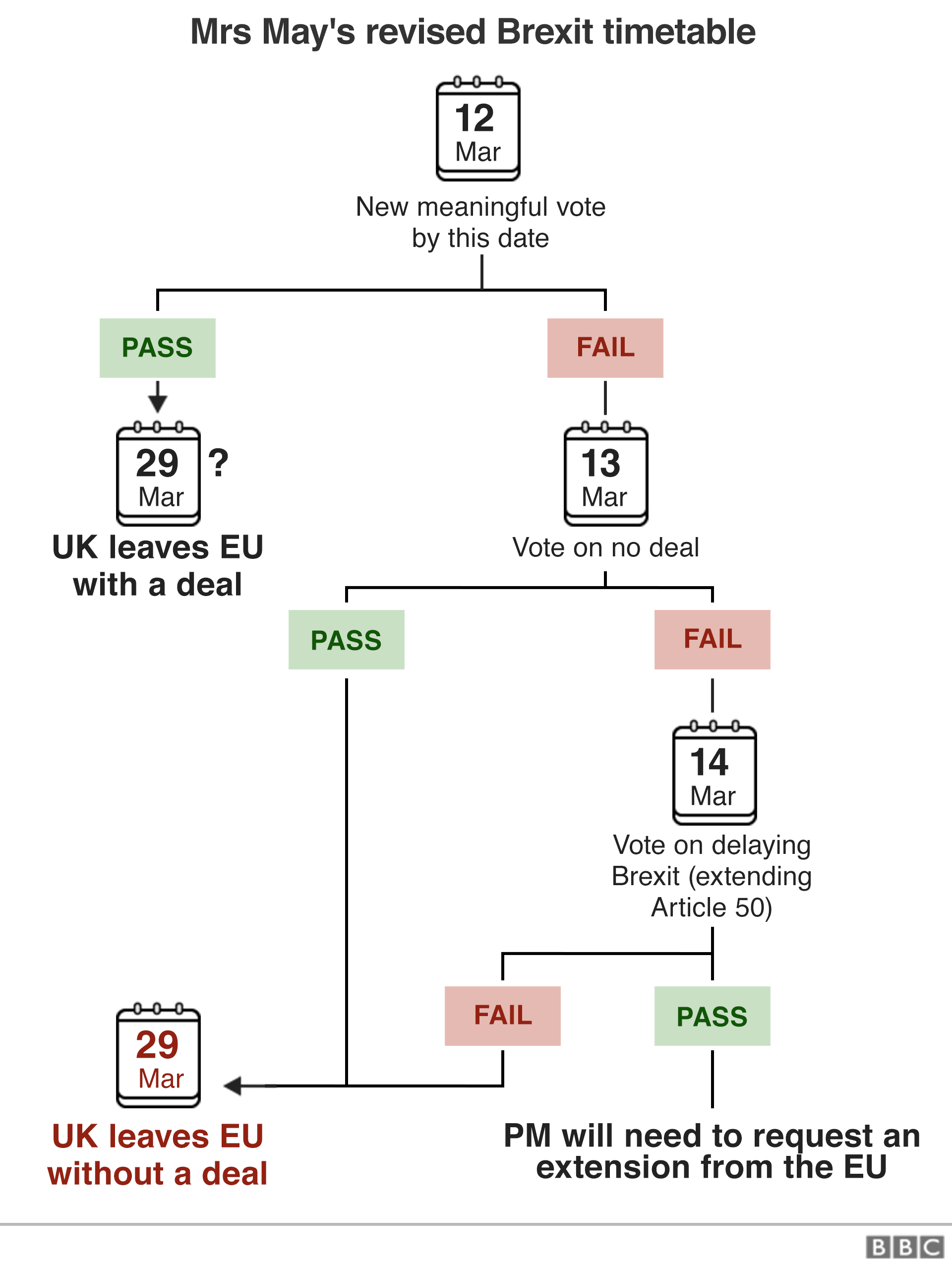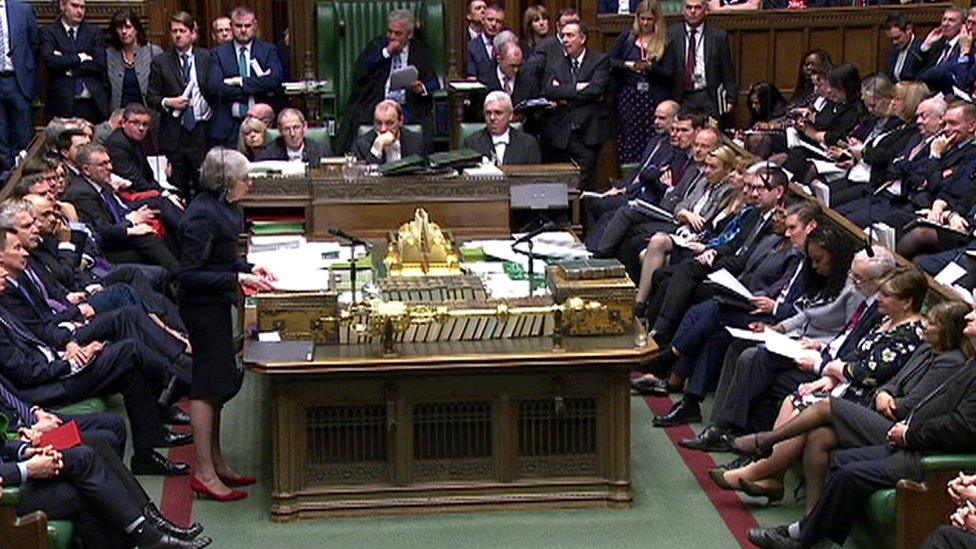Theresa May offers MPs Brexit delay vote
- Published
- comments
Theresa May: "An extension cannot take no deal off the table."
Theresa May has promised MPs a vote on delaying the UK's departure from the EU or ruling out a no-deal Brexit, if they reject her deal next month.
Mrs May made a statement to MPs about Brexit on Tuesday, amid the threat of a revolt by Remain-supporting ministers.
The PM has promised MPs a meaningful vote on her Brexit deal by 12 March.
But Labour leader Jeremy Corbyn accused the prime minister of another "grotesquely reckless" Brexit delay.
The prime minister said she will put her withdrawal agreement - including any changes she has agreed with the EU - to a meaningful vote by 12 March.
If that fails, MPs will be offered two separate votes:
One, on the following day, on whether MPs support a no-deal Brexit - so the UK would "only leave without a deal on 29 March if there is explicit consent in the House for that outcome"
If that fails, then MPs will get a vote by 14 March on requesting an extension to the two-year Article 50 negotiation process to delay EU withdrawal beyond 29 March
"Let me be clear, I do not want to see Article 50 extended," she told MPs.
"Our absolute focus should be on working to get a deal and leaving on 29 March."
Any extension should not go beyond the end of June and "would almost certainly have to be a one-off", she added.


Mrs May said an extension "cannot take no deal off the table", adding: "The only way to do that is to revoke Article 50, which I shall not do, or agree a deal."
Extending Article 50 would require the unanimous backing of the other 27 EU member states and, she said, she had not had conversations about it with them.
Allow X content?
This article contains content provided by X. We ask for your permission before anything is loaded, as they may be using cookies and other technologies. You may want to read X’s cookie policy, external and privacy policy, external before accepting. To view this content choose ‘accept and continue’.
Mrs May repeatedly declined to say whether she would vote against a no-deal Brexit, and whether Tory MPs would be whipped to vote for or against it.

A significant tactical retreat

By the BBC's deputy political editor John Pienaar
Theresa May's big concession - and it was a significant tactical retreat - was about buying herself more time.
So now, under the threat of maybe 15 to 20 ministers rebelling, the prime minister's promised MPs an opportunity next month to rule out a no-deal Brexit, and force a "limited" delay in leaving the EU.
Without that promise, there's every chance those unhappy ministers would have joined other MPs in voting to rule out no-deal and delay Brexit anyway.
She did not offer ministers freedom to vote as they choose. So now the (potential) rebels must decide whether to hold fire for a fortnight, while she tries to get terms in Brussels she can sell to the Commons - hoping Brexiteers ultimately back her deal as the best Brexit available.
Call it "running down the clock", or "kicking the can down the road", if you like.
But kicking and running has been Mrs May's best hope for months.

Will Tory rebels accept May's offer?
Several Remain-backing ministers were threatening to resign, so that they could vote for a cross-party amendment aimed at ruling out a no-deal Brexit, when MPs vote on a government motion on Wednesday.
Conservative Caroline Spelman and Labour's Jack Dromey said they "welcomed" the PM's statement but they would still table amendments paving the way for a bill to extend Article 50.
They will then "seek assurances from ministers during [the] debate to secure confirmation of the prime minister's commitments, which we hope will mean we will not push our amendments to a vote", the pair said in a joint statement.
Another of the MPs behind the amendment, Conservative Sir Oliver Letwin, had earlier said there was no need for it now, because the prime minister's statement "does what is needed to prevent a no-deal exit on 29 March".

But opponents of Mrs May who support another EU referendum said she had still not ruled out a no-deal Brexit.
The Independent Group's Anna Soubry, who quit the Conservatives in protest at their Brexit policy, said it was a "shameful moment" and "nothing has changed".
Anna Soubry asks Theresa May if "nothing has changed, and no deal remains firmly on the table."
What about Tory Brexiteers?
Jacob Rees-Mogg, the chairman of the European Research Group of Leave-backing Conservative MPs, said: "My suspicion is that any delay to Brexit is a plot to stop Brexit.
"This would be the most grievous error that politicians could commit."
And the Democratic Unionist Party?
Speaking after a meeting with Theresa May, DUP Leader Arlene Foster said the PM had to deliver on her commitment to get legally-binding changes to her EU withdrawal agreement.
"Experience in Northern Ireland has shown that extending deadlines does nothing to encourage a deal," she said.
The EU had it "in their hands" to avoid a no-deal Brexit, she added, and come up with a deal which MPs can support.
"It's time for Dublin and Brussels to be in a deal-making mode," she said.
Labour's reaction
Corbyn: PM's handling of Brexit negotiations "grotesquely reckless"
Jeremy Corbyn said he had "lost count" of the prime minister's explanations for her "grotesquely reckless" Brexit delays.
"The prime minister continues to say it is her deal or no deal, but this House has decisively rejected her deal and has clearly rejected no deal," he told MPs.
"It is the prime minister's obstinacy that is blocking a resolution."
Mr Corbyn says Labour will get behind another EU referendum if the party can't get its own Brexit proposals through Parliament on Wednesday.
If Mrs May's Brexit deal gets through Parliament next month, Labour wants it to be put to a public vote - with remaining in the EU as the other option.
SNP reaction
The SNP's Westminster leader Ian Blackford said Mrs May "could not be trusted" not to "dodge" another meaningful vote.
He said: "It's the height of irresponsibility for any government to threaten its citizens with these consequences.
"Rule out no deal, extend Article 50, but do it today - this should not be left until the middle of March."
But Mrs May surprised the House by quoting a TV advert in her response: "If he wants to end the uncertainty and deal with the issues he raised...then he should vote for a deal. Simples."